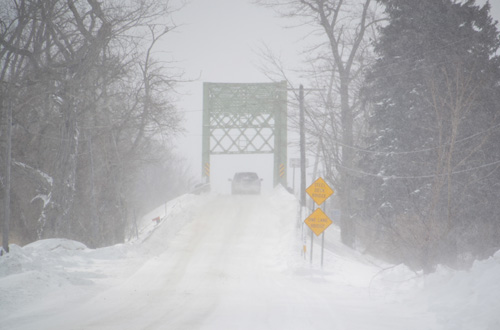Hawley criticizes proposed legislation requiring snow to be removed from vehicles

File photo by Tom Rivers: A truck heads south on Gaines Basin Road to cross the canal bridge in this photo from February 2015.
State Assemblyman Steve Hawley (R-Batavia) is criticizing three proposed bills in the State Legislature that would mandate New Yorkers remove snow from the roofs of their vehicles.
The legislative proposals are gaining traction in the State Capitol and will most likely be reintroduced in the upcoming legislative session, Hawley said. The threshold for the amount of snow and ice that must be removed is not specifically mentioned. Most of these bills are sponsored by members of the Legislature from New York City, its suburbs or Long Island, Hawley said.
“This is a perfect example of how myopic some downstate representatives are,” Hawley said. “My district lies in the snow belt where people sometimes can’t even open their front doors after a big storm, let alone shovel all the snow off of their vehicles. These bills would place a large burden on our trucking and transportation industries, where drivers, usually on a tight schedule, would have to climb to the top of their rigs and shovel off feet of snow, placing them in a dangerous situation.
Assembly Bill A1082 says motor vehicles, with certain exceptions, “shall not be operated with an accumulation of snow or ice on the surface thereof.” The legislation establishes fines for violations with some of the fine money going to the state’s “snow and ice removal fund” as well as a public awareness campaign.
Assembly Bill A01584 and Senate Bill S00243 require noncommercial vehicles less than 10,000 pounds “to be cleared of accumulated snow, sleet or hail.” Those bills exempt any automobile transporter, motorcycle or authorized emergency vehicle.
“This is a case where my ‘Two New Yorks’ bill would be useful,” Hawley said. “I have been calling for a ballot referendum on the simple of question of ‘Do you support the division of New York into two separate states?’ for many years now because of the legislative, cultural and economic divide that is so apparent. If New York City and the surrounding areas want to enact such a measure, then they should be able to, but leave upstate New York alone.”





































































